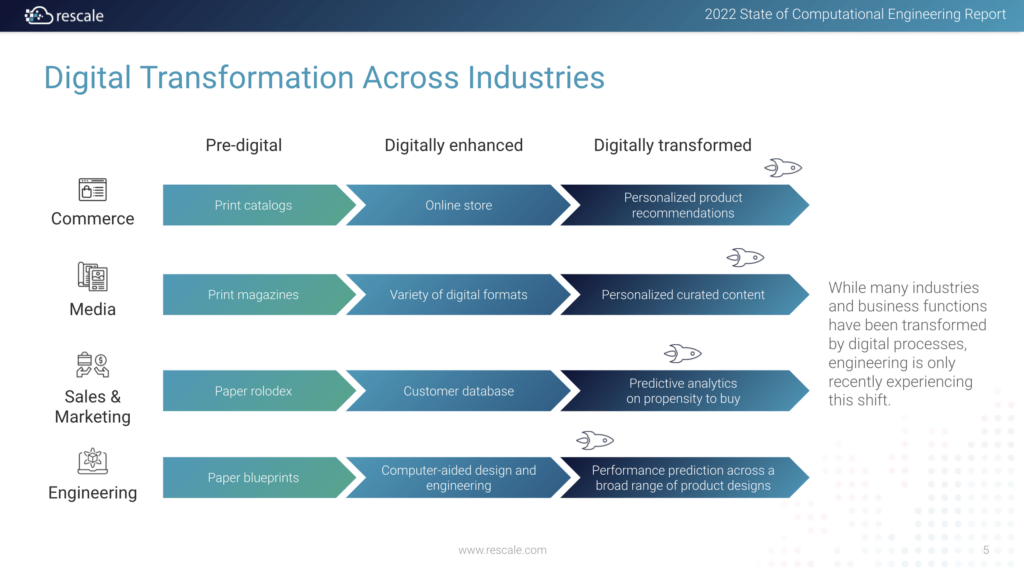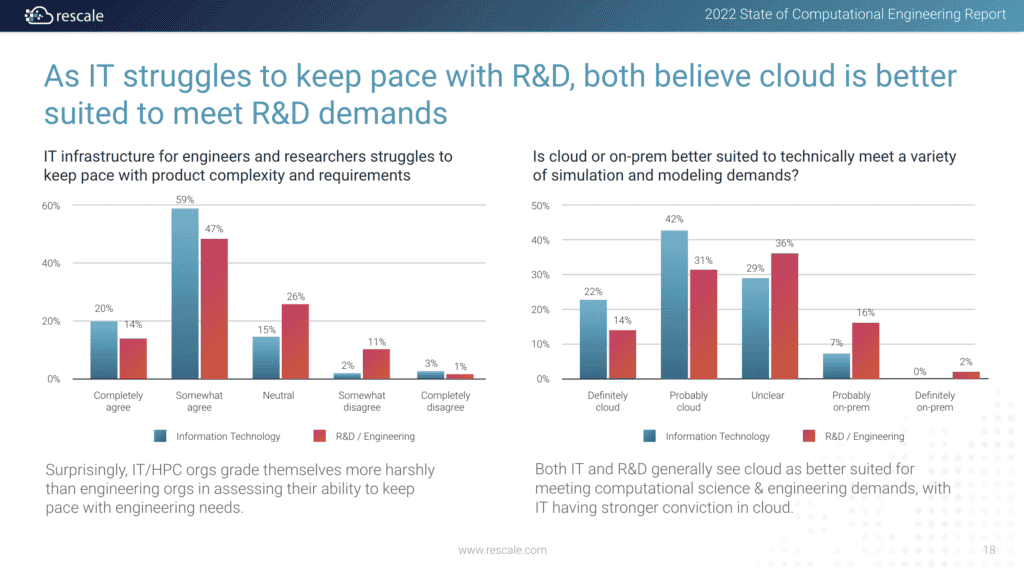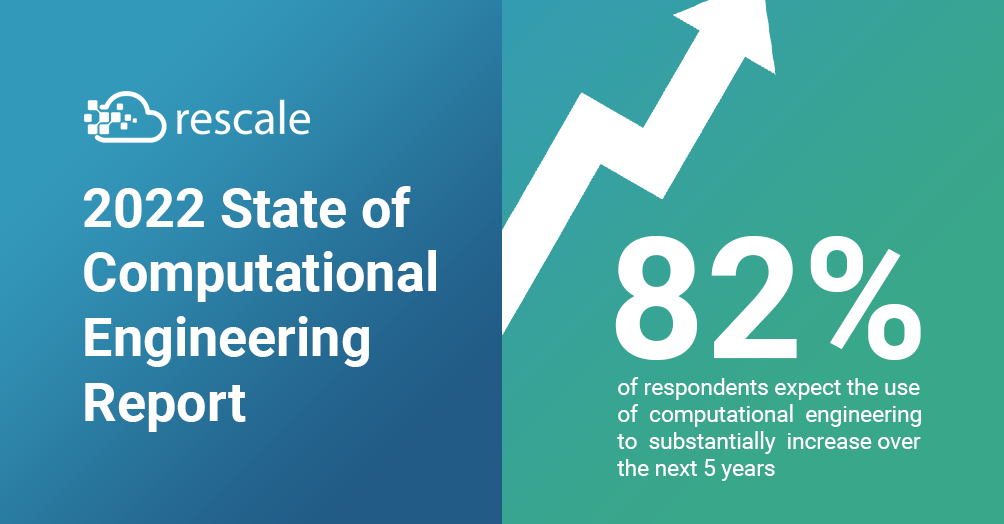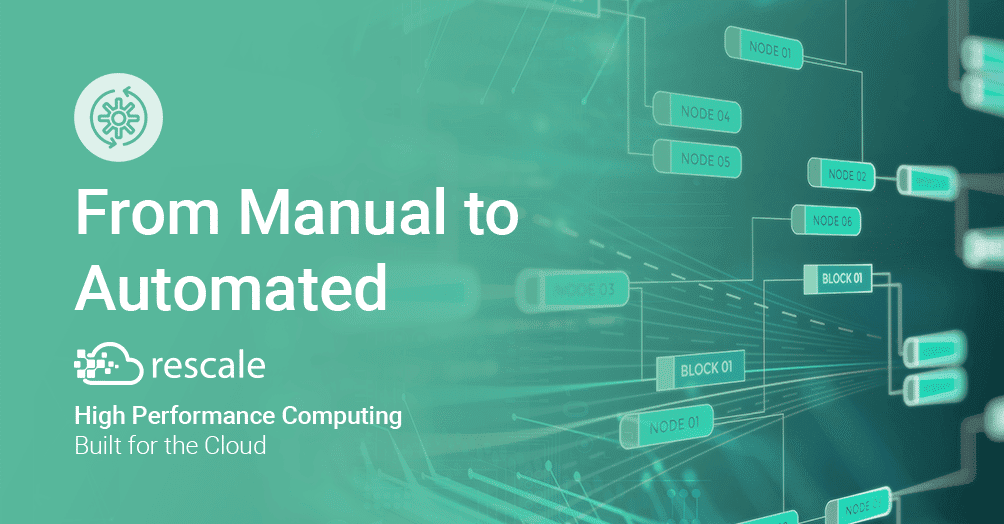Announcing the 2022 State of Computational Engineering Report
The rise of computational engineering and key insights from digital engineering and science practitioners
We are excited to announce the latest Rescale report, The 2022 State of Computational Engineering, featuring survey findings from the industry’s most innovative engineers and companies building the next generation of technologies. In the past decade, nearly every industry has experienced digital transformation, changing the way organizations design and test products. With more advanced tooling, R&D teams are able to accelerate new product development while increasing business efficiencies. Among the many new digital tools available, the growth in computational engineering has had an outsized impact on engineering possibilities from aerospace to life sciences.
This report shines a light on the rise of computational engineering, a relatively recent phenomenon with its early beginnings in the 1960s and currently undergoing a significant revolution. Similar to how e-commerce, digital media, and CRM revolutionized entire industries, engineering techniques have transformed how physical products are produced. Online vendors and media outlets have developed digital capabilities like serving predictive and personalized services globally and near-instantly thanks to the benefits of cloud and personal computing. However, due to the computational complexity of developing new products that depend on multi-disciplinary variables (e.g. physics, chemistry, etc), engineering has trailed behind in terms of digital transformation.

Previously considered largely research and practiced often in academic settings, high performance computing and simulation are now widely used by corporations and many industries. Building upon computer science and computer-aided design (CAD) foundations, more sophisticated methods like computer-aided engineering (CAE) are converging with artificial intelligence and machine learning to accelerate product development. The possibilities that emerge in this space include broad design space exploration, generative design, digital twins, and other methods leading to increased quality and speed of finished goods. In this report we survey the practitioner experience of implementing, managing, and commercializing these new computational technologies.
Rescale has a unique vantage point to observe the opportunities and challenges posed by digital transformation initiatives and hope our findings help other organizations develop high-impact strategies. Key observations in this report include:
- Engineers with access to computational engineering resources are more likely to achieve project goals
- Easier access to computational resources leads to improved digital R&D capabilities, e.g. automated workflows
- Modern engineering needs are outpacing IT’s ability to support them
- Cloud computing offers enhanced technical capabilities over on-premises for a variety of applications
- Organizations with strong cloud and automation capabilities have implemented digital transformation strategies
- The role of computational engineering is expected to continue growing in the next five years
These results indicate a sea change in organizations’ prioritization and usage of computation in their engineering and how they are choosing to build strategies for the future. The link between computational resources and positive business outcomes is all but clear; engineering teams supported with the right software, hardware, and productivity tools are more likely to deliver products on time and under budget. While this may seem obvious, many obstacles still exist, from poor user experience to architectural inefficiencies that can diminish productivity.
This year’s report features exciting “Profiles in Innovation” from Rescale customers from organizations in advanced fields that use computational engineering to drive tangible business value. Their proof points further indicate that having a strategy that incorporates intelligence, automation, and cloud into existing digital engineering practices can pay dividends. Many respondents cite challenges supporting new digital initiatives especially in light of distributed workplaces and increasingly collaborative work streams. However, most organizations still plan to continue investing and expanding their use of computational engineering and favor cloud-based strategies to meet growing needs.

Whether you are an engineer looking to build better products, a scientist looking to uncover your next breakthrough, or a technology leader looking to improve the performance and efficiency of your teams, we’ve assembled this report to help you.








